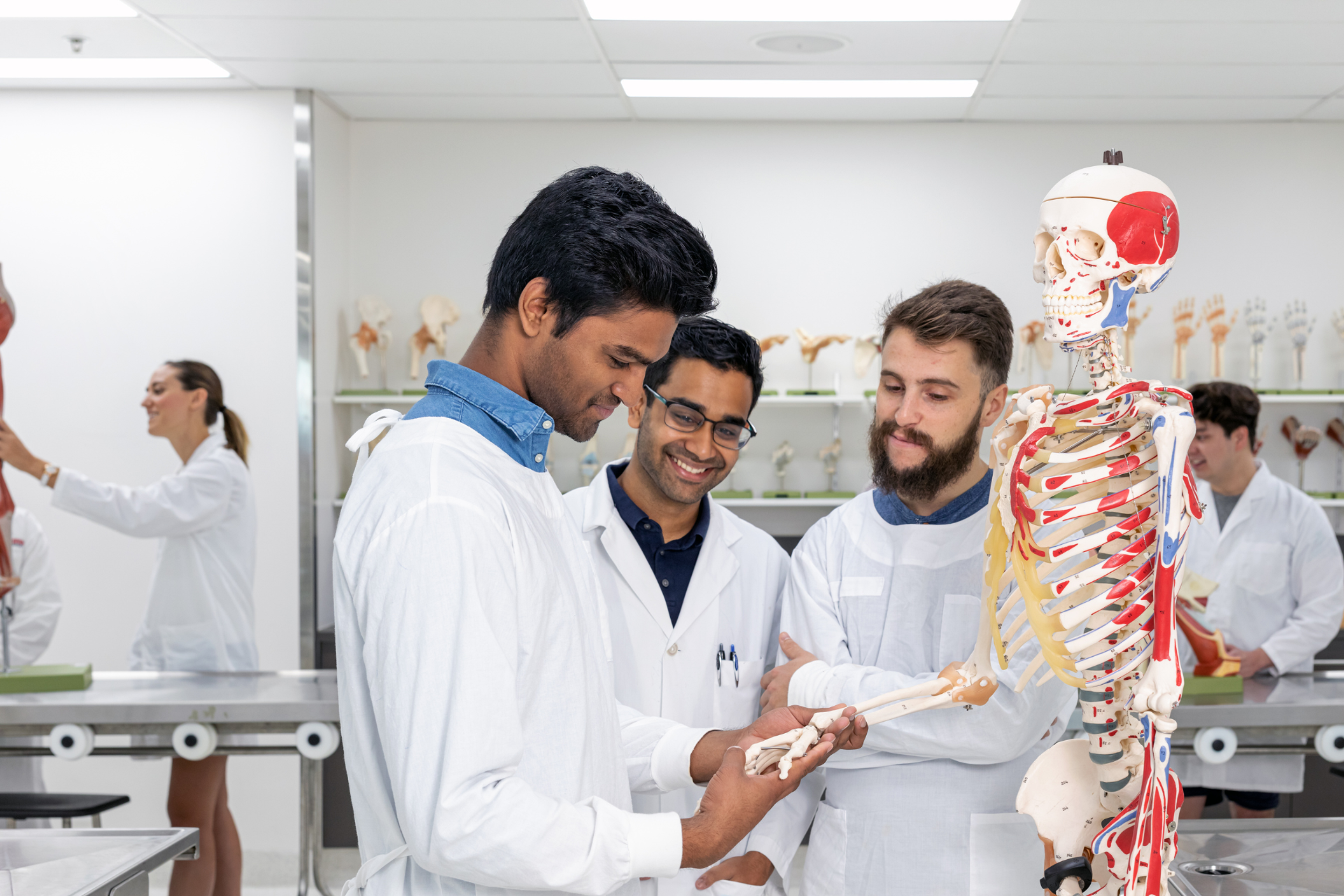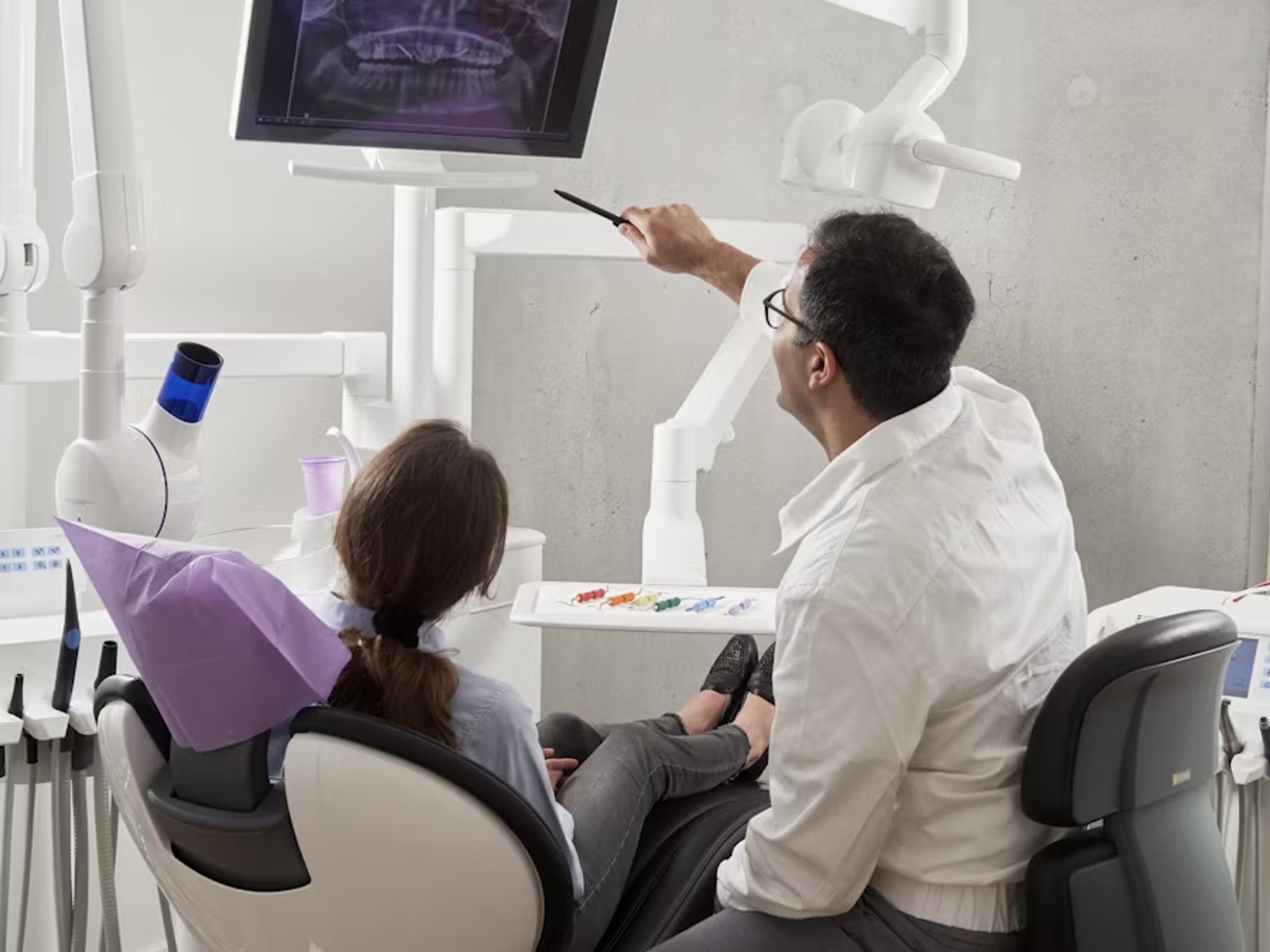The Different Types of Medical Careers – and Which One is Right for You
A comprehensive overview of the different types of medical degrees, certificates, and programs along with the average salary, curriculum, and more to help you decide which career path in healthcare is right for you.
Posted June 13, 2025

Join a free event
Learn from top coaches and industry experts in live, interactive sessions you can join for free.
Table of Contents
Introduction: Careers in Medicine
So, you’re interested in pursuing a medical degree! Whether you're drawn to the fast-paced environment of emergency medicine, the intricacies of surgical procedures, the continuous care provided in family practice, or something else entirely, the medical field encompasses a diverse spectrum of roles that align with many different passions and skill sets. Whatever your interests, there is a career in medicine for you.
Compared to many other career paths, the healthcare and medicine fields are also expected to grow much faster over the next decade, providing more opportunities and job security. According to the Bureau of Labor Statistics, 1.8 million positions are expected to open each year through 2032, and the median salary for these roles is much higher than the national average for all occupations.
In this comprehensive guide, we’ll go through the many different types of degrees and career paths in medicine and help you figure out which one is the best fit for you.
The Medical Degree Landscape
Due to the variety and breadth of options within the medical field, understanding the medical degree landscape is a pivotal step in exploring and planning your career path. Here are several of the most common educational pathways for different types of medical degrees.
Certificate & Associate Degree Programs
- Certified Nursing Assistant (CNA): Short-term training programs, often several weeks long, that lead to certifications. CNAs provide basic care and assist with nursing-related tasks under the direction of a registered nurse (RN) or a licensed practical nurse (LPN).
- Licensed Practical Nurse (LPN)/Licensed Vocational Nurse (LVN): Typically require one year of vocational training. LPNs/LVNs provide basic nursing care and are required to pass the NCLEX-PN exam.
- Other Healthcare Certifications: Certificate programs or associate degrees that prepare students to perform imaging tests like X-rays. Requirements can vary, but supplemental certification or licensure might be needed.
- Medical Coding Specialist (CCS-P) or Professional Coder (CPC)
- Patient Care Technician (CPCT)
- EKG Technician (CET)
- Phlebotomy Technician (CPT)
- Clinical Medical Assistant (CCMA)
- Medical Assistant (CMA)
- Registered Behavioral Technician (RBT)
- Pharmacy Technician (CPhT)
- Optician (ABO)
Bachelor’s Degree Programs
- Pre-Medical (Pre-Med) Track: While not a degree in itself, the pre-med track is a selection of undergraduate courses in biology, chemistry, physics, and math designed to prepare students for medical school. Students pursuing this track typically choose to major in the sciences though they could pursue anything, provided they complete the prerequisite courses for medical school.
- Bachelor of Science in Nursing (BSN): A four-year undergraduate program preparing students for a career in nursing. BSN graduates are eligible to take the NCLEX-RN to become registered nurses (RNs).
- Bachelor’s in Health Sciences: Offers foundational knowledge in health and can lead to careers in health administration, public health, and other non-clinical roles. It can also serve as a stepping stone to graduate-level medical degrees.
Graduate Degree Programs
- Doctor of Medicine (MD) and Doctor of Osteopathic Medicine (DO): Both are four-year professional degrees requiring a bachelor's degree for admission. These programs include two years of basic medical sciences followed by two years of clinical rotations. Graduates must complete residency programs to practice as physicians.
Read: D.O. vs. M.D.: The Differences and Similarities - Master of Science in Nursing (MSN): For nurses aiming to advance their careers, the MSN degree offers pathways to specialized roles like nurse practitioners, nurse educators, or nurse administrators.
- Doctor of Pharmacy (PharmD): A four-year professional degree program for those seeking to become pharmacists. It requires two to four years of undergraduate pre-pharmacy coursework for admission.
- Doctor of Dental Surgery (DDS) or Doctor of Medicine in Dentistry (DMD): Both are four-year degrees required to practice dentistry, following completion of a bachelor’s degree and specific prerequisites.
- Doctor of Veterinary Medicine (DVM): Typically a four-year degree with three years of in-class courses followed by a year of clinical rotations.
- Physician Assistant (PA) Programs: Typically a Master's level program, PA programs prepare students to practice medicine under the supervision of physicians and surgeons. They usually require 2-3 years of postgraduate study and clinical rotations.
Other Programs & Pathways
- Advanced Practice Registered Nurses (APRNs): Including Nurse Practitioners (NPs), Certified Nurse-Midwives (CNMs), Clinical Nurse Specialists (CNSs), and Certified Registered Nurse Anesthetists (CRNAs)
- Public Health Degrees: Master of Public Health (MPH) or Doctor of Public Health (DrPH) prepare professionals for careers in public health policy, management, and research.
- Specialized Allied Health Degrees: Available in fields like physical therapy, occupational therapy, speech-language pathology, and audiology and often require specific master's or doctoral degrees (e.g., Doctor of Physical Therapy (DPT), Master of Science in Occupational Therapy).
- Postgraduate Fellowships and Residencies: These are required for those who want to pursue medical and surgical specialties, beyond the initial MD or DO degrees.
- Research Degrees: Including Ph.D. programs, these are critical for those pursuing careers in medical research and/or academia.
This list is comprehensive, but not exhaustive. There are many different routes in the medical field.
Skills You Need to Succeed in the Medical Field
The healthcare industry as a whole is not only a testament to scientific and technological advancements, but also a domain where interpersonal skills, resilience, and a passion for lifelong learning play critical roles in shaping successful careers. Whether you're aspiring to become a physician, nurse, pharmacist, or any healthcare professional, certain universal skills will help you succeed:
- Strong Communication: Effective communication is paramount in healthcare, serving as the cornerstone for both patient interaction and team collaboration. Healthcare professionals must exhibit clarity and compassion when communicating with patients, ensuring accurate diagnoses and effective care. Similarly, the ability to articulate ideas and concerns clearly is vital for working cohesively with colleagues, ensuring that patient care is coordinated and efficient.
- Critical Thinking & Problem-Solving: Healthcare professionals are tasked with making accurate diagnoses and adapting to unforeseen challenges, requiring robust critical thinking and problem-solving skills. The ability to assess complex medical information quickly and accurately is essential, as is the capacity to think creatively and adapt when faced with changing conditions and emergencies.
- Empathy & Compassion: Empathy and compassion are the heart of patient-centered care, establishing trust and fostering a supportive environment for both patients and their families. Cultural sensitivity is also crucial in delivering equitable care, respecting the diverse backgrounds and needs of each patient.
- Attention to Detail: In the medical field, where the stakes are high, precision and meticulous attention to detail are imperative. This rigor ensures patient safety and effective care, from administering treatments to maintaining accurate and comprehensive patient records.
- Physical & Emotional Stamina: The demanding nature of healthcare requires professionals to have both physical and emotional stamina. The ability to withstand long hours and the resilience to manage the emotional toll of high-stress situations, including dealing with loss, are critical for sustaining a career in this field.
- Lifelong Learning: A commitment to lifelong learning is essential in the fast-evolving medical field, allowing professionals to stay abreast of new treatments, technologies, and best practices. Embracing innovation and continuous education is key to enhancing patient care and operational efficiency.
Comprehensive List of Medical Degrees
Now that we’ve covered some of the different routes to these degrees and the skills you’ll need to succeed, let’s dive into many of the different kinds of medical degrees along with the level of education required, the duration of study, the curriculum, average salaries, and more for each.
Clinical Medicine Degrees & Programs
Doctor of Medicine (MD)
- Level of Education: Graduate school, followed by additional training for specialized fields
- Duration: 4 years of medical school, followed by 3-7 years of residency training depending on the specialty
- Curriculum: Includes 2 years of basic medical sciences, followed by two years of clinical rotations
- Average Salary: Varies by specialty, but around $352,000
- Potential Career Paths: Surgeon, physician, medical researcher, hospital administrator
Read:
Doctor of Osteopathic Medicine (DO)
- Level of Education: Same as MD programs – graduate school, plus training for specialties
- Duration: Same as MD programs – 4 years, plus residency
- Curriculum: Similar to MD programs, with additional training in osteopathic manipulative medicine
- Average Salary: Comparable to MD positions, varying by specialty
- Potential Career Paths: Family medicine physician, pediatrician, sports medicine, physical rehabilitation
Doctor of Podiatric Medicine (DPM)
- Level of Education: Graduate school
- Duration: 4 years, plus 2 years of residency
- Curriculum: Includes basic medical sciences, clinical sciences, and extensive training in foot and ankle surgery
- Average Salary: Approximately $228,000
- Potential Career Paths: Podiatrist in private practice, hospitals, clinics, or sports medicine teams
Doctor of Chiropractic (DC)
- Level of Education: Graduate school
- Other Training Required: Licensure is required in all states, which typically involves passing the National Board of Chiropractic Examiners exam
- Duration: 4 years (no residency required)
- Curriculum: Emphasizes anatomy, physiology, pathology, neurology, biomechanics, X-ray, chiropractic techniques, and patient care
- Average Salary: $85,000
- Potential Career Paths: Chiropractor in private practice, sports teams, multidisciplinary clinics, or educational roles
Doctor of Optometry (OD)
- Level of Education: Graduate school
- Other Training Required: Licensure in the state of practice, requiring passing the National Board of Examiners in Optometry (NBEO) exams
- Duration: 4 years
- Curriculum: Covers ocular anatomy, pharmacology, optics, visual science, and extensive clinical practice in diagnosing and managing ocular diseases
- Average Salary: $120,000
- Potential Career Paths: Optometrist in private practice, healthcare settings, research, military, or public health
Bachelor of Medicine, Bachelor of Surgery (MBBS)
- Level of Education: Specialized undergrad
- Duration: 5-6 years
- Curriculum: Comprehensive coverage of medicine and surgery, theoretical learning, and practical rotations
- Average Salary: In the U.S. it’s equivalent MD salaries apply after passing USMLE and completing residency
- Potential Career Paths: Broad, including all fields of medicine and surgery
Non-Degree Granting Career Paths in Clinical Medicine
Emergency Medical Technician (EMT) and Paramedic
- Training Required: EMT training programs can take a few months to complete, whereas paramedic programs require more extensive training, often one to two years, including both coursework and clinical experience
- Role: EMTs and paramedics provide emergency medical care and transportation for the sick or injured in pre-hospital settings
- Average Salary
- EMT: $20/hr (approx $41,000/year)
- Paramedic: $26/hr (approx. $54,000/year)
Medical Laboratory Technician (MLT)
- Training Required: Certificate programs or associate degrees in medical laboratory technology, typically taking about 2 years, followed by certification
- Role: MLTs perform laboratory tests on patient samples to provide data for diagnosing and treating diseases
- Average Salary: $57,000
Radiologic Technician
- Training Required: Certificate programs, diplomas, or associate degrees in radiography, usually completed in 1-2 years, followed by certification and licensure.
- Role: Radiologic technicians perform diagnostic imaging examinations, such as X-rays, under the supervision of radiologists.
- Average Salary: $65,000
Dialysis Technician
- Training Required: Typically includes a combination of classroom education and hands-on clinical experience and programs can last from a few months to a year, leading to a certificate; some states require passing an exam
- Role: These technicians operate dialysis machines and assist patients who are undergoing dialysis treatments for kidney failure – they prepare patients, monitor the dialysis process, and perform necessary adjustments to the machine settings as needed
- Average Salary: $45,000
Cardiovascular Technologist and Technician
- Training Required: Either a 2-year associate degree or a 1-year certificate program, although some may undergo on-the-job training (certificates are not usually required but recommended); programs cover invasive procedures, non-invasive procedures, or cardiac sonography
- Role: Assist physicians in diagnosing and treating cardiac (heart) and peripheral vascular (blood vessel) diseases; technologists may specialize in invasive procedures, like catheterizations, non-invasive imaging, or vascular technology
- Average Salary: $43,000-91,000 (varies heavily depending on location, education, and experience)
Get Into Your Dream Medical Career Path
Work with an expert medical coach for one-on-one personalized consulting on your career path. Whether you’re applying to a school/program, figuring out what you want to do, or just looking for some guidance, there is someone for you.
Pharmacy Degrees
This category is for degrees that prepare individuals for careers in pharmacology, including both clinical and community pharmacy settings.
Read: Pharmacy Vs. Medical School: Which One is Right for You
Doctor of Pharmacy (PharmD)
- Level of Education: Graduate school
- Other Training Required: Licensure via passing the North American Pharmacist Licensure Examination (NAPLEX)
- Duration: 4 years
- Curriculum: Pharmacology, pharmacy law, medical ethics, and clinical rotations
- Average Salary: Around $130,000
- Potential Career Paths: Pharmacist in community, clinical, or hospital settings; pharmaceutical research and development
Master of Science in Pharmacy (MSc Pharmacy)
- Level of Education: Graduate school
- Other Training Required: Licensure is not typically required for non-clinical roles that most MSc graduates pursue, but certification in specialized areas (e.g., regulatory affairs) can enhance job prospects
- Duration: 2 years
- Curriculum: Focuses on advanced topics in pharmaceutical sciences, such as pharmacology, pharmaceutics, medicinal chemistry, and pharmaceutical biotechnology, often including a research project or thesis
- Average Salary: $120,000 (varies dramatically depending on career path)
- Potential Career Paths: Research positions in pharmaceutical and biotechnology companies, quality control and assurance, regulatory affairs specialist, drug safety specialist, roles in clinical research organizations, and positions in governmental or non-governmental health organizations
Non-Degree Granting Career Paths in Pharmacy Medicine
Pharmacy Technician
- Training Required: On-the-job training or certificate programs, which can last from several months to a year; certification requirements vary by state
- Role: Pharmacy technicians assist pharmacists in dispensing prescription medication to customers or health professionals
- Average Salary: $37,000
Nursing Degrees & Programs
These degrees prepare individuals for roles in nursing, from entry-level positions to advanced practice roles.
Read: Nursing Vs. Medical School: Pros, Cons, and Which One is Right for You
Master of Science in Nursing (MSN)
- Level of Education: Graduate school
- Other Training Required: Licensure as a registered nurse (RN), certification in specialty area
- Duration: 2-3 years
- Curriculum: Advanced nursing concepts, leadership, and a specialization area (e.g., family nurse practitioner, nurse educator)
- Average Salary: $90,000
- Potential Career Paths: Nurse practitioner, clinical nurse specialist, nurse educator, nurse administrator
Bachelor of Science in Nursing (BSN)
- Level of Education: Undergraduate degree
- Other Training Required: Passing the National Council Licensure Examination (NCLEX-RN) to become a registered nurse; additional certifications may be pursued in specialized areas
- Duration: 4 years (traditional program); accelerated programs may take 12-18 months for those with a prior bachelor's degree
- Curriculum: Covers nursing theory, practical nursing skills, patient care technology, community health, and clinical rotations in various healthcare settings
- Average Salary: $77,000
- Potential Career Paths: Registered nurse in hospitals, clinics, schools, public health, or specialized areas such as pediatrics, emergency care, and oncology
Associate Degree in Nursing (ADN)
- Level of Education: Associate degree
- Other Training Required: Passing the National Council Licensure Examination for Registered Nurses (NCLEX-RN) to become licensed
- Duration: 2 years
- Curriculum: Focuses on the fundamentals of nursing practice, including anatomy, physiology, microbiology, nutrition, and nursing care across various patient populations
- Average Salary: Roughly the same as a BSN (both paths lead to registered nurse)
- Potential Career Paths: RNs can work in hospitals, outpatient clinics, long-term care facilities, and home health care; many pursue further education through RN-to-BSN programs for advancement
Doctor of Nursing Practice (DNP)
- Level of Education: Doctoral/Terminal degree
- Other Training Required: For APRNs, certification in a specialty area (e.g., family nurse practitioner, nurse anesthetist) is often required, in addition to licensure
- Duration: Depends, generally 3-4 years; can either do a BSN to DNP or MSN to DNP
- Curriculum: Advanced practice nursing, leadership, healthcare policy, evidence-based practice, and a capstone project that applies research to clinical practice problems
- Average Salary: $115,000
- Potential Career Paths: Advanced practice registered nurses (APRNs), including nurse practitioners, nurse anesthetists, clinical nurse specialists, nurse midwives, and roles in nursing leadership, administration, and healthcare policy
Non-Degree Granting Career Paths in Nursing
Certified Nursing Assistant (CNA)
- Training Required: Short-term training programs, typically a few weeks to a few months in length, followed by passing a competency exam
- Role: CNAs provide basic care to patients, such as assisting with daily activities, monitoring vital signs, and providing support to nursing staff
- Average Salary: $36,000
Licensed Practical Nurse (LPN)/Licensed Vocational Nurse (LVN)
- Training Required: Typically a year-long diploma or certificate program, followed by passing the National Council Licensure Examination (NCLEX-PN)
- Role: LPNs/LVNs provide basic nursing care under the supervision of RNs and doctors, such as monitoring patient health, administering basic patient care, and providing medication
- Average Salary: $48,000
Dentistry Degrees
Degrees under this category focus on oral health, preparing graduates to practice as dentists or in dental specialties.
Doctor of Dental Surgery (DDS) / Doctor of Medicine in Dentistry (DMD)
- Level of Education: Graduate school
- Other Training Required: Licensure in the state of practice; specialties require additional training
- Duration: 4 years, plus residency for specialties
- Curriculum: General dentistry education, clinical practice
- Average Salary: General dentists around $170,000 annually; specialists earn more
- Potential Career Paths: General dentist, orthodontist, oral and maxillofacial surgeon, pediatric dentist
Non-Degree Granting Career Paths in Dentistry
Dental Assistant
- Training Required: On-the-job training, certificate programs, or diploma programs, which can range from a few months to about a year, with certification options available
- Role: Dental assistants provide patient care, take X-rays, keep records, and schedule appointments, working closely with dentists and dental hygienists
- Average Salary: $44,000
Allied Health Profession Degrees
These degrees are for health professions that support, aid, and increase the efficiency of the healthcare team but do not involve becoming a physician or a nurse.
Doctor of Physical Therapy (DPT)
- Level of Education: Graduate school
- Other Training Required: Licensure via passing the National Physical Therapy Examination (NPTE)
- Duration: 3 years
- Curriculum: Anatomy, physiology, biomechanics, diagnosis, and hands-on clinical practice
- Average Salary: $97,000
- Potential Career Paths: Physical therapist in hospitals, private practices, rehabilitation centers, and sports facilities
Physician Assistant (PA)
- Level of Education: Graduate school
- Other Training Required: Passing the Physician Assistant National Certifying Examination (PANCE) for licensure
- Duration: 2-3 years
- Curriculum: Medical sciences, clinical medicine across various specialties, and clinical rotations
- Average Salary: $126,000
- Potential Career Paths: PAs can work in various specialties, including family medicine, surgery, pediatrics, and emergency medicine, often under the supervision of a physician
Read:
Bachelor of Science in Radiologic Technology (BSRT)
- Level of Education: Undergraduate degree
- Other Training Required: Certification and licensure are typically required, which may involve passing an exam from the American Registry of Radiologic Technologists (ARRT)
- Duration: 4 years
- Curriculum: Patient care procedures, radiation physics, radiation protection, principles of imaging, medical terminology, positioning of patients, and radiographic anatomy
- Average Salary: $65,000
- Potential Career Paths: Radiologic technologists, CT technologists, MRI technologists, radiology department management
Bachelor of Science in Respiratory Therapy (BSRT)
- Level of Education: Undergraduate degree
- Other Training Required: Licensure is required in most states, typically involving passing a national exam administered by the National Board for Respiratory Care (NBRC)
- Duration: 4 years
- Curriculum: Cardiopulmonary physiology, patient assessment, pulmonary rehabilitation, critical care, pediatric and neonatal care, and mechanical ventilation
- Average Salary: $70,000
- Potential Career Paths: Respiratory therapists in hospitals, long-term care, home health care, pulmonary rehabilitation clinics, and sleep centers
Master of Science in Occupational Therapy (MSOT)
- Level of Education: Graduate school
- National certification exam for occupational therapists (NBCOT) and state licensure
- Duration: 2-3 years
- Curriculum: Human anatomy, neuroscience, psychology, occupational therapy theory and practice, assessment and intervention strategies, and fieldwork
- Average Salary: $93,000
- Potential Career Paths: Occupational therapists in hospitals, outpatient clinics, schools, rehabilitation centers, and home health services
Master of Science in Speech-Language Pathology (MS-SLP)
- Level of Education: Graduate school
- Other Training Required: Passing the Praxis Examination in Speech-Language Pathology and completing a clinical fellowship for certification by the American Speech-Language-Hearing Association (ASHA)
- Duration: 2 years
- Curriculum: Phonetics, anatomy and physiology of speech, hearing science, neuroanatomy, language development, diagnostic procedures, and therapeutic techniques, plus clinical practicum
- Average Salary: $85,000
- Potential Career Paths: Speech-language pathologists in hospitals, schools, private practice, early intervention programs, and research
Bachelor of Science in Medical Laboratory Science (BSMLS)
- Level of Education: Undergraduate degree
- Other Training Required: Certification by organizations like the American Society for Clinical Pathology (ASCP) is often required or preferred
- Duration: 4 years
- Curriculum: Clinical chemistry, microbiology, hematology, immunology, clinical microscopy, blood banking, and laboratory management
- Average Salary: $70,000
- Potential Career Paths: Medical laboratory scientists/technicians in hospitals, clinics, public health facilities, and research labs
Bachelor of Science in Nutrition and Dietetics (BSND)
- Level of Education: Undergraduate degree
- Other Training Required: A supervised internship is required for RD certification, followed by passing the Commission on Dietetic Registration (CDR) exam
- Duration: 4 years
- Curriculum: Nutritional sciences, biochemistry, physiology, food service systems management, clinical nutrition, and dietetics
- Average Salary: $69,000
- Potential Career Paths: Registered dietitians in hospitals, community health programs, food service management, private practice, and nutrition counseling
Master of Science in Genetic Counseling (MSGC)
- Level of Education: Graduate school
- Other Training Required: Certification through the American Board of Genetic Counseling (ABGC) after completing a board exam
- Duration: 2 years
- Curriculum: Genetics, genomics, counseling skills, psychosocial theory, bioethics, and clinical rotations in various settings
- Average Salary: $90,000
- Potential Career Paths: Genetic counselors in hospitals, clinics, research centers, and as consultants in biotechnology or pharmaceutical companies
Doctor of Audiology (AuD)
- Level of Education: Doctoral degree
- Other Training Required: Licensure in the state of practice; certification by the American Board of Audiology is optional but recommended
- Duration: 4 years
- Curriculum: Anatomy and physiology of the ear, audiology diagnostics, hearing aids, cochlear implants, auditory processing, balance disorders, and clinical practicum
- Average Salary: $82,000
- Potential Career Paths: Audiologists in hospitals, private practice, schools, rehabilitation centers, and research institutions
Non-Degree Granting Career Paths in Allied Health Professions
Medical Assistant (MA)
- Training Required: Certificate programs or associate degrees in medical assisting, typically taking 9 months to 2 years, with certification options available post-training.
- Role: Medical assistants perform a variety of tasks including taking patient histories and vital signs, assisting with examinations, and performing administrative tasks such as scheduling appointments and maintaining medical records.
- Average Salary: $20/hr (~$41,000/yr)
Phlebotomy Technician
- Training Required: Phlebotomy certificate programs, which can last from a few weeks to several months; some states require certification or licensure
- Role: Phlebotomy technicians are responsible for drawing blood from patients for medical testing, transfusions, research, or blood donations
- Average Salary: $38,000
Surgical Technologist
- Training Required: Certificate or associate degree programs in surgical technology, typically lasting from a few months to 2 years (certification is required or preferred by many employers)
- Role: Surgical technologists prepare operating rooms, arrange equipment, and help doctors during surgeries; they are responsible for ensuring the environment is sterile and must be familiar with various surgical instruments and procedures
- Average Salary: $57,000
Health Information Technician
- Training Required: Postsecondary certificate or associate degree in health information technology; certification, such as the Registered Health Information Technician (RHIT) credential, is often required
- Role: Health information technicians organize and manage health information data – they ensure its quality, accuracy, accessibility, and security in both paper and electronic systems
- Average Salary: $47,000
Careers in Public Health, Mental Health, & Veterinary Medicine
This list above covers most of the traditional career paths in medicine. There are other opportunities outside of these in health-adjacent professions and non-traditional routes. For example, public health degrees prepare individuals for roles in the management, policy, and research of health systems, with an emphasis on improving health outcomes for communities and populations. Mental health-focused degrees prepare individuals for careers in psychological counseling, therapy, and clinical psychology. Veterinary medicine degrees allow individuals to work with animal health, treatment, and surgery.
Public Health Degrees
- Master of Public Health (MPH)
- Master of Science in Public Health (MSPH)
- Master of Health Administration (MHA)
- Master of Science in Environmental Health (MHS)
- Master of Science in Biostatistics (MSB)
- Master of Science in Health/Biomedical Informatics (MSHI)
- Master of Arts in Health Communication (MAHC)
- Master of Public Policy (MPP) with a focus on Health Policy
- Master of Science in Global Health (MSGH)
- PhD in Public Health
Mental Health Degrees
- Doctor of Psychology (PsyD)
- Master of Social Work (MSW)
- Master of Arts (MA) or Master of Science (MS) in Counseling
- PhD in Clinical Psychology
- PhD in Counseling Psychology
- MA or MS in Marriage & Family Therapy
- Other Degrees with Mental Health Specializations
- MSN (Master’s of Science in Nursing) with a Psychiatric-Mental Health Nurse Practitioner (PMHNP) Specialization
- MD or DO specializing in Psychiatry
- MPH specializing in Mental Health
Veterinary Medicine Degrees
- Doctor of Veterinary Medicine (DVM)
Medical Degree Specializations
The medical field offers a plethora of specialization options for those pursuing advanced degrees. These specializations allow medical professionals to focus on specific areas of interest, honing their skills and knowledge to provide specialized care.
Comprehensive List of Medical Specializations
- Allergy and Immunology: Focuses on diagnosing and treating allergies, asthma, and other disorders of the immune system.
- Anesthesiology: Medical experts in pain management and anesthesia during surgery and other procedures.
- Cardiology: Specializes in diagnosing and treating diseases of the heart and blood vessels.
- Dermatology: Focuses on skin, hair, and nail conditions, including cosmetic issues and skin cancer.
- Emergency Medicine: Deals with acute illnesses and injuries that require immediate medical attention.
- Endocrinology: Focuses on hormone-related diseases and conditions affecting the endocrine system, such as diabetes and thyroid disorders.
- Family Medicine: Provides comprehensive healthcare for individuals and families across all ages, genders, and diseases.
- Gastroenterology: Specializes in diseases of the digestive system, including the stomach, intestines, liver, and gallbladder.
- General Surgery: Involves surgical treatment for a wide range of conditions, particularly in the abdomen.
- Geriatrics: Focuses on health care of elderly people, aiming to promote health by preventing and treating diseases and disabilities in older adults.
- Hematology: The study of blood, blood-forming organs, and blood diseases.
- Infectious Disease: Specializes in diseases caused by bacteria, viruses, fungi, and parasites.
- Internal Medicine: Focuses on the diagnosis, treatment, and prevention of nonsurgical conditions in adults.
- Medical Genetics: Deals with the diagnosis and management of hereditary disorders.
- Nephrology: Focuses on diseases of the kidneys and how they affect the rest of the body.
- Neurology: Deals with disorders of the nervous system, including the brain and spinal cord.
- Neurosurgery: Involves surgical procedures on the nervous system, including the brain and spinal cord.
- Obstetrics and Gynecology: Concerned with childbirth and the care of women giving birth, as well as conditions of the female reproductive system.
- Oncology: The study and treatment of tumors (cancer).
- Ophthalmology: Deals with eye diseases and surgery.
- Orthopedic Surgery: Focuses on injuries and diseases of the musculoskeletal system, including bones, joints, muscles, tendons, and ligaments.
- Otolaryngology (ENT): Specializes in conditions of the ear, nose, and throat, as well as related structures of the head and neck.
- Pathology: The study of the causes and effects of diseases, especially the examination of body tissue for diagnostic purposes.
- Pediatrics: Focuses on the physical, emotional, and social health of infants, children, adolescents, and young adults.
- Physical Medicine and Rehabilitation: Aims to enhance and restore functional ability and quality of life to those with physical impairments or disabilities.
- Plastic Surgery: Focuses on repairing, reconstructing, or replacing physical defects of form or function involving the skin, musculoskeletal system, cranio and maxillofacial structures, hand, extremities, breast and trunk, and external genitalia.
- Psychiatry: Deals with the diagnosis, treatment, and prevention of mental, emotional, and behavioral disorders.
- Pulmonary Medicine: Concerned with diseases of the lungs and the respiratory tract.
- Radiation Oncology: The use of radiation to treat cancer.
- Radiology: The use of medical imaging to diagnose and sometimes treat diseases within the body.
- Rheumatology: Focuses on the diagnosis and therapy of rheumatic diseases, which affect the joints, soft tissues, autoimmune system, and heritable connective tissue disorders.
- Urology: Deals with diseases of the urinary tract and the male reproductive system.
Highest-Paid Medical Specializations
Salaries for medical professionals can vary significantly by region, experience, and practice setting. However, here are some specialties that are generally known to be among the highest-paid, along with the average salary.
- Neurosurgery: $675,000
- Plastic Surgery: $576,000
- Orthopedic Surgery: $540,000
- Gastroenterology: $500,000
- Urology: $460,000
- Cardiology: $420,000
- Anesthesiology: $410,000
- Dermatology: $380,000
- Radiology: $380,000
- Ophthalmology: $350,000
Medical Specializations by Length of Study
The length of study includes years of residency and fellowship after medical school and can vary based on the specific requirements of each specialty and subspecialty.
- Neurosurgery: Up to 8 years of residency
- Thoracic Surgery: Typically 5-7 years including a surgery residency followed by a thoracic surgery fellowship
- General Surgery: 5 years of residency
- Orthopedic Surgery: 5 years of residency
- Plastic Surgery: 6 years in an integrated program or 3 years of residency after a 5-year general surgery residency
- Cardiology: 3 years of internal medicine residency plus 3 years of cardiology fellowship
- Gastroenterology: 3 years of internal medicine residency plus 3 years of gastroenterology fellowship
- Dermatology: 4 years of residency
- Anesthesiology: 4 years of residency
- Family Medicine: 3 years of residency
When considering a specialization, think about your interests, the type of patients you want to work with, and the kind of work environment you thrive in. Each specialization comes with its unique challenges and rewards, and it's crucial to choose a path that aligns with your career goals and personal values.
How to Choose the Right Medical Career Path for You
Choosing the right medical career path is a significant decision that requires careful consideration of your interests, strengths, and career goals. Here are some steps to help you make an informed choice:
1. Start by assessing your interests and strengths
Reflect on what areas of medicine excite you and consider your skills and strengths. Do you enjoy working with children, or are you fascinated by the complexity of the human brain?
Ask yourself:
- What aspects of medicine am I most passionate about?
- Do I prefer direct patient care or working behind the scenes in research or diagnostics?
- What are my strongest skills, and how can they be applied in the medical field?
- Am I more interested in a broad spectrum of general medicine or specialized care?
- How do I feel about dealing with difficult or emotionally challenging situations?
2. Research the fields you’re most interested in
Explore the different medical degrees and specializations available. Look into the daily responsibilities, work environment, and challenges faced by professionals in each field.
Ask yourself:
- What are the main responsibilities in each medical specialty I'm considering?
- What is the typical work environment like for these fields (hospital, clinic, lab, etc.)?
- What challenges do professionals in these areas face, and how do they manage them?
- How does each field align with my personal interests and strengths?
- What are the emerging trends or technologies in these fields?
3. Consider the educational requirements
Each medical career has specific educational and training requirements. Think about the length of time and the level of commitment you are willing to invest in your education.
Ask yourself:
- How many years of education and training are required for each field I'm interested in?
- What is the competitive nature of getting into these programs or specialties?
- Am I prepared for the financial investment required for medical school and beyond?
- How do the licensing and certification requirements vary across different medical fields?
- Am I willing and able to relocate for education or training opportunities?
4. Evaluate the projected job outlook and salary
Research the job outlook and potential salary for the medical careers you're considering. While passion should be a primary driver, practical considerations such as job stability and financial security are also important.
Ask yourself:
- What is the projected demand for professionals in each field I'm considering?
- How do the starting salaries compare among these fields, and what is the potential for growth?
- How economically stable are these specialties over the long term?
- What factors could influence job availability in these fields in the future?
- How do salary and job outlook balance with my personal and financial goals?
5. Gain research or clinical experience
If possible, gain firsthand experience in the medical field through internships, shadowing, or volunteer opportunities. This can provide valuable insights into what a career in medicine entails and help you determine if it's the right fit for you.
Ask yourself:
- What opportunities are available for shadowing, internships, or volunteering in my areas of interest?
- How can I get a realistic view of the day-to-day responsibilities and challenges in these fields?
- What skills or insights can I hope to gain from these experiences?
- How will these experiences influence my application to medical school or specialty programs?
- Are there opportunities for research or academic involvement in these areas during my pre-medical education?
6. Talk to professionals
Talk to people already working in the medical field. They can offer advice, share their experiences, and provide a realistic perspective on the pros and cons of their specialties.
Ask yourself:
- Who are the professionals in my network or community who can provide insight into these careers?
- What specific questions should I ask them about their career paths and day-to-day experiences?
- How did they decide on their specialty, and what advice do they have for someone in my position?
7. Think about your expectations and desire for work-life balance
Reflect on how different medical careers align with your personal life and future goals. Some specialties may require longer hours or more on-call duties, which can impact work-life balance.
Ask yourself:
- What are the typical hours and schedules for professionals in each field I'm considering?
- How do these careers accommodate personal time, family, and hobbies?
- What is the stress level typically associated with these specialties, and how do professionals manage it?
- Are there opportunities for part-time work, flexible scheduling, or telemedicine in these fields?
- How might my career choice impact my long-term personal and family goals?
Early Assurance, Early Decision, and BS-to-MD Programs
For aspiring medical students seeking a more streamlined or guaranteed pathway into medical school, there are several specialized programs designed to simplify the traditional medical school application process and reduce the duration of training. Understanding the nuances of Early Assurance, Early Decision, and BS-to-MD Programs can help candidates make informed choices about their medical education journey.
Early Assurance Programs (EAPs)
Early Assurance Programs offer undergraduate students the opportunity to secure a place in medical school, often at the end of their sophomore or junior year, without taking the MCAT. These programs are designed for students who have demonstrated exceptional academic performance and a strong commitment to a career in medicine early in their undergraduate education.
- Benefits: EAPs reduce the pressure of the traditional medical school application process and allow students to focus on their studies and extracurricular activities without the stress of applying to multiple medical schools.
- Considerations: Applicants to EAPs must be sure of their choice to pursue medicine as a career, as these programs typically bind students to a specific medical school early on.
Early Decision Programs (EDPs)
Early Decision Programs allow students to apply to one medical school, usually their top choice, and receive an early admission decision. Like EAPs, EDPs are suitable for students who are confident about their choice of medical school and are committed to attending if accepted.
- Benefits: EDPs can simplify the application process by allowing students to focus on a single application and potentially secure admission early in the cycle.
- Considerations: The major downside is the binding nature of the decision; if accepted, students are committed to attending that school and must withdraw all other applications.
Read: Medical School Early Decision Programs: Overview & Guide
BS-to-MD Programs
BS-to-MD (or BA-to-MD) Programs are combined undergraduate and medical school programs that allow high school graduates to enter a streamlined educational track leading directly to an MD. These programs can be completed in six to eight years, thereby reducing the time and cost associated with obtaining a medical degree.
- Benefits: These programs offer a guaranteed path to medical school, allowing students to avoid the traditional medical school application process. They often provide a cohesive, integrated curriculum that blends undergraduate and medical education.
- Considerations: BS-to-MD programs are highly competitive and require a significant commitment from students, who must be certain of their desire to pursue a career in medicine from a young age. These programs also limit the opportunity to explore other interests or career paths during undergraduate years.
Read:
- Comprehensive List of 7-Year BS/MD Programs (2024)
- The 10 Best Accelerate Physician Assistant Programs (3+2)
Ready to Take the Next Step Toward Your Medical Career?
The sheer variety of medical degrees and career paths can feel overwhelming, but that’s also what makes this field so exciting. Whether you're aiming to become a physician, nurse, pharmacist, therapist, or another type of healthcare professional, there's a route that aligns with your strengths, values, and long-term goals.
But no one figures this out alone. If you're still unsure about which direction to go, how to strengthen your application, or how to turn your interests into a clear plan, a Leland medical coach can help. Our experts include physicians, PAs, pharmacists, public health leaders, and admissions insiders who’ve been in your shoes—and now help others break into the field with clarity and confidence.
Book a free intro call with a Leland medical coach to get tailored guidance on programs, applications, study plans, and more.
Medical Degrees FAQs
What are the main types of medical degrees available?
- The main types of medical degrees include Doctor of Medicine (MD), Doctor of Osteopathic Medicine (DO), Bachelor of Medicine, Bachelor of Surgery (MBBS), Master of Science in Nursing (MSN), Doctor of Pharmacy (PharmD), and Doctor of Dental Surgery (DDS) or Doctor of Dental Medicine (DMD), among others that you can read about above
How do I choose the right medical degree for my career goals?
- Consider your interests in healthcare, whether you prefer direct patient care or research, the length of study you're prepared for, and the type of work environment you envision for yourself. Researching various medical fields and speaking with professionals can also help guide your decision.
What is the difference between an MD and a DO?
- Both MD (Doctor of Medicine) and DO (Doctor of Osteopathic Medicine) degrees qualify graduates to practice as physicians. The main difference lies in their training and philosophy; DOs receive additional training in the musculoskeletal system and tend to have a holistic approach to patient care.
How long does it take to complete a medical degree?
- The duration varies by the type of degree. For example, MD and DO programs typically take 4 years to complete, followed by residency training. Nursing and pharmacy degrees can range from 2 to 4 years, depending on the level of education pursued.
Are there different types of medical degrees?
- Yes, there are many options for careers in healthcare outside of becoming a doctor, such as a Bachelor of Science in Nursing (BSN), Doctor of Pharmacy (PharmD), Physician Assistant (PA) degrees, and healthcare administration degrees, as well as many other paths that only require a certificate or associate degree.
What are some high-demand medical fields?
- High-demand medical fields include family medicine, psychiatry, anesthesiology, pediatrics, and general surgery. The demand can vary based on geographic location and healthcare trends.
Can I specialize further after obtaining a medical degree?
- Yes, after completing a medical degree, you can pursue further specialization through residency programs, fellowships, and board certifications in areas such as cardiology, neurology, orthopedic surgery, and more.
What are the financial considerations for pursuing a medical degree?
- Pursuing a medical degree can be costly, with considerations including tuition, living expenses, and potential debt. However, financial aid, scholarships, and loan forgiveness programs are available for eligible students.
How competitive are medical degree programs?
- Medical degree programs can be highly competitive, with acceptance rates varying by school and program. Strong academic records, test scores, and relevant experience are necessary to improve your chances of admission.
What is the best 2-year medical degree?
- The "best" 2-year medical degree depends on your career goals and interests. Popular options include Associate Degrees in Nursing (ADN), which can lead to becoming a Registered Nurse (RN), or an Associate’s Degree in Radiologic Technology, which prepares you for a career as a radiologic technologist. Both are in demand and offer rewarding career paths in healthcare.
What is the quickest medical degree?
- Certificates or diploma programs in fields like phlebotomy, medical assisting, and licensed practical nursing (LPN) are among the quickest pathways into the medical field, often taking less than two years to complete. The quickest post-MD route is a primary care residency, which typically lasts about 3 years. These include Family Medicine, Internal Medicine, and Pediatrics.
How many years is medical school? How long does it take to obtain an MD degree?
- Medical school typically takes four years to complete for a Doctor of Medicine (MD) degree. This is followed by residency training, which can range from 3 to 7 years, depending on the specialty. So, the total commitment can be anywhere from 7 to 11 years after undergraduate studies.
Is medical school hard?
- Medical school is challenging due to the rigorous academic workload, the volume of material students must learn, and the emotional and physical demands of clinical rotations. However, many students find it rewarding and manage the challenges with proper support and time management.
What does MD mean in degree?
- MD stands for Doctor of Medicine. It is a professional degree awarded to graduates of medical school who are trained to practice medicine.
Is an MD higher than a doctorate?
- An MD (Doctor of Medicine) is a type of professional doctorate degree specific to the practice of medicine. While it is not "higher" than a Doctor of Philosophy (Ph.D.) or other doctoral degrees, it is specialized and signifies that the holder is qualified to practice as a physician. The distinction lies more in the field of study and professional application than in the level of academic achievement.
Browse hundreds of expert coaches
Leland coaches have helped thousands of people achieve their goals. A dedicated mentor can make all the difference.


















